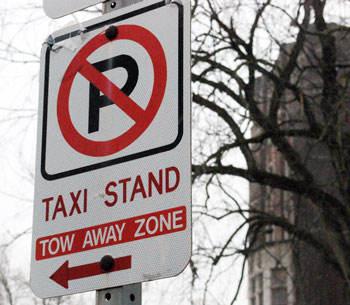Ann Arbor Taxicab Board Grants Appeal
Ann Arbor city taxicab board meeting (Jan. 24, 2013): The taxicab board’s agenda included two main items: (1) an appeal from a driver who’d been denied a taxicab license when he applied last year; and (2) scheduling of future meetings.

Taxi stand sign on State Street in front of the Michigan Union. From the city’s taxicab ordinance: “Only licensed taxicabs are permitted to park on the taxicab stand.”
The driver’s application had been denied by the city based on the fact that he currently has 7 points on his license – stemming from a right-on-red violation and a speeding violation. The city’s ordinance stipulates that a license to operate a taxicab doesn’t have to be granted if an applicant has more than 6 points on their license. The board quizzed the prospective driver about past traffic infractions and his intentions for future employment, before deciding to grant his appeal.
The outcome of the board’s discussion on meeting time led to a decision to fix its regular meeting time for the fourth Thursday of the month at 5:30 p.m. That’s a decision that applies to the next six months. Before deciding to commit to that schedule, the board weighed the fact that its newest member – Eric Sturgis, whose appointment had been confirmed by the city council just two days earlier – had applied for appointment with the understanding that the regular meeting time was 8 a.m. Sturgis wasn’t able to attend the Jan. 24 meeting.
During public commentary, the board heard from representatives of taxicab companies who complained about limousines that operate as taxicabs – which appears to be an ongoing problem. Under the city’s ordinance, it’s not possible for a vehicle to be licensed as a limousine under the state’s rules and simultaneously operate as a taxicab. The board heard the specific complaint that limousine companies violate the “top light” rule, which prohibits “for hire” lights on the top of vehicles – unless they are licensed as taxicabs.
At the meeting, the board’s city council representative, Stephen Kunselman (Ward 3), responded to the complaints by indicating that the board is very aware of the issue. He added that the city’s lobbyist is working on that issue with the state legislature.
The responsibility of the city’s taxicab board is “to enforce the taxicab ordinance, hear appeals of those who are aggrieved by any decision made by the administrator and adopt regulations to facilitate the administration of the taxicab ordinance.” [Full Story]



